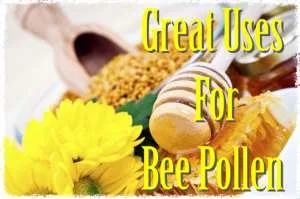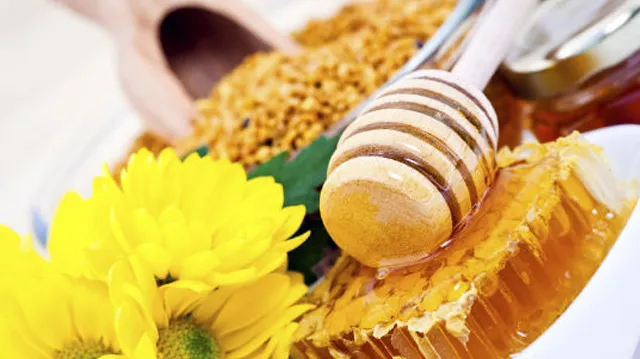If you have not yet embraced the wide variety of benefits that bee pollen offers, it is high time to give this superfood some serious consideration. While it may look a little funny, bee pollen is remarkably healthy, and deserves a starring role in a nutritious diet.
Bee pollen is made when honeybees collect the male seed of a flower blossom, and combine it with their own digestive enzymes. The resulting product is then used to feed young bees, so that they grow strong and thrive. Don’t worry though—when you eat bee pollen, you are not stealing food from baby bees—it can be collected sustainably so that hive populations do not suffer.
So, why add bee pollen to your diet? Well, for starters, it is considered by many health experts to be a complete, nutritious whole food. It contains about 40 percent protein, amino acids that can be easily used by the body, and a wide range of vitamins (including many B-vitamins and vitamin D), minerals, and antioxidants.
In fact, bee pollen was so prized by the ancient Greeks and Romans that it was referred to as “ambrosia,” which translates from Latin to “food of the gods.”
The following are a few specific reasons why this “food of the gods” should be in your smoothie or parfait glass:
Combat inflammation throughout the body
One of the main benefits of bee pollen is its anti-inflammatory nature. Inflammation is the body’s natural reaction to an invader, and consists of swelling tissues and sometimes pain. While this reaction is beneficial for a short time, as it can keep pathogens out of the body, when it becomes chronic, you may be in for trouble.
Chronic inflammation has been linked to a wide range of chronic conditions, including cancers, heart disease, and autoimmune conditions.
Along with its vitamins and minerals, bee pollen contains flavonoid antioxidants, as well as the antioxidant lycopene (usually associated with tomatoes), which work together to combat inflammation throughout all of the body’s systems. Not only can this help prevent disease, it may even help to slow the aging process.
Additionally, bee pollen has been found to be potentially beneficial in soothing skin inflammation, such as eczema and psoriasis, as well as to respiratory inflammation, which can lead to conditions such as asthma if left unchecked.
Keep your immune system in tip-top shape
Also, the antioxidants and nutrients found in bee pollen work together to support optimal gut health—and a healthy gut has been closely tied to a healthy immune system. Regularly consuming bee pollen may help to prevent such illnesses as colds and flus, and may also shorten recovery time should these conditions occur.
Wait… there’s more!
In addition to reducing inflammation and supercharging the immune system, here are some examples of how bee pollen may also help:
- Soothes seasonal allergies by lowering sensitivity to local pollens
- Supports cardiovascular health
- Provides optimal energy throughout the day
- Amps up your metabolism
- Relieves symptoms of depression
- Curbs cravings for unhealthy foods, and even reduce cravings for alcohol and other drugs
- Provides important digestive enzymes to help keep you regular
- Balances your endocrine system
- Enhances fertility
- Aids in system-wide detoxification
- Creates conditions for optimal oxygen delivery to the body’s cells
- Reduces your risk of cancer and many other chronic illnesses
So, how do you eat bee pollen, anyway? While there are many options, one great way is to serve it on top of some organic Greek yogurt and fresh fruit—the fibers in the fruit are thought to enhance the pollen’s powers. It also works great in smoothies, and can even add some texture to a fruit salad.
What’s your favorite way to enjoy bee pollen?
-The Alternative Daily
Sources:
http://foodmatters.tv/articles-1/10-amazing-health-benefits-of-bee-pollen
http://healthblog.ivlproducts.com/blog/healthyliving/9-benefits-of-bee-pollen
http://www.mercola.com/article/diet/bee_pollen.htm
http://www.ncbi.nlm.nih.gov/pubmed/20455966
http://undergroundhealthreporter.com/bee-pollen-health-benefits/#axzz3GGn6qrY7
http://www.biomedcentral.com/1472-6882/10/30

